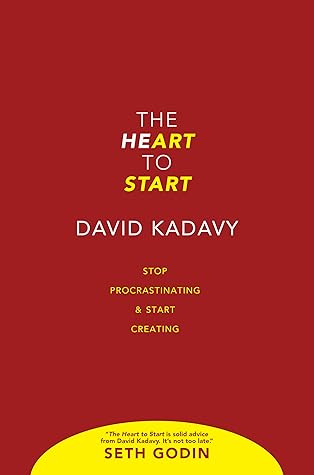More on this book
Community
Kindle Notes & Highlights
me, the discomfort you endure pursuing your art is
better than being delusional.
Your will to start making your art has to fight against everything that tries to hold it back.
When was the last time you lost track of time while doing something?
You have to find the right balance between exploitation and exploration.
Even if you’re not the best in the world at any one of those curiosities, chances are you’re the best in the world at your particular combination of curiosities.
there’s no fuel more powerful than your own curiosity.
Big ideas tap into the collective consciousness.
overcome the Fortress Fallacy, all you have to do is recognize that you tend to dream beyond your current abilities.
With my new relationship to books, I had complete permission to start wherever I liked and to put the book down if it wasn’t interesting. I found
you have many little pockets of time throughout the day when you could start making your art.
What low-commitment things do you end up doing instead of making your art?
Change your perception of what it takes to get started.
similar mental distortion makes us think that we need to make our art in a linear progression. We’ll cover this in the next chapter and discuss what to do about it.
As I started to write more, I discovered that it worked better for me to write a draft first. Then I’d use that draft to write an outline, and I’d use that outline to write my final draft.
It’s easy to fall into the trap of expecting creative work to happen linearly, as if writing is as simple as putting one word after another, or as if painting is as simple as putting a brush to canvas.
The Linear Work Distortion is the false belief that creative work is a neat, step-by-step process, wherein the final product steadily reveals itself. In fact, that’s not how creative work really happens. It’s often messy, and iterative.
To overcome perfectionism and get started, you need to accept that your first attempts will not be up to your standards. You have to give yourself Permission to Suck.
Because it’s in the process of doing that bad work that the good work comes out.
“I write one page of masterpiece to ninety-one pages of shit.”
When you start off with bad work, the very fact that you started propels you to do better work.
One of the principles of the martial art of judo is that you use your opponent’s energy against himself. If he comes charging at you with a punch, you can use that forward momentum to throw him over your shoulder. You can do the same thing with your ego. With Motivational Judo, you use the force of your own ego to kickstart your project and keep yourself moving.
Instead, we tend to cheat subconsciously. Through
As Dan says, “We cheat up to the level that allows us to retain our self-image as reasonably honest individuals.”
you pay close attention, you’ll notice that you cheat yourself out of making your art all the time.
You have to apply just the right amount of force in your commitments.
This is why my ten-minute timer was so powerful.
“You can do anything for twenty minutes. You can hold your breath for twenty minutes.”
Setting a timer to commit to a small work session is not to be confused with the “Pomodoro Technique,”
The purpose of Motivational Judo is to gain enough momentum that you don’t need a break.
Pomodoro does work for some people, but honestly, if I needed a break every twenty-five minutes, I would take that as a sign that I needed to find a new line of work.
I had to set a timer for ten minutes because that was the sweet spot for bypassing my ego.
Understand that your art is a journey of self-actualization.
Let your dream be your guiding star while putting one foot in front of the other.
By accepting that your early work won’t meet your standards, you can free yourself up for action.
By finding the part of the project that is easy for you to do, but that will build momentum to do the harder parts of the project, you keep
yourself moving – with more fun, and less pain – all the way to an explosive finish.


